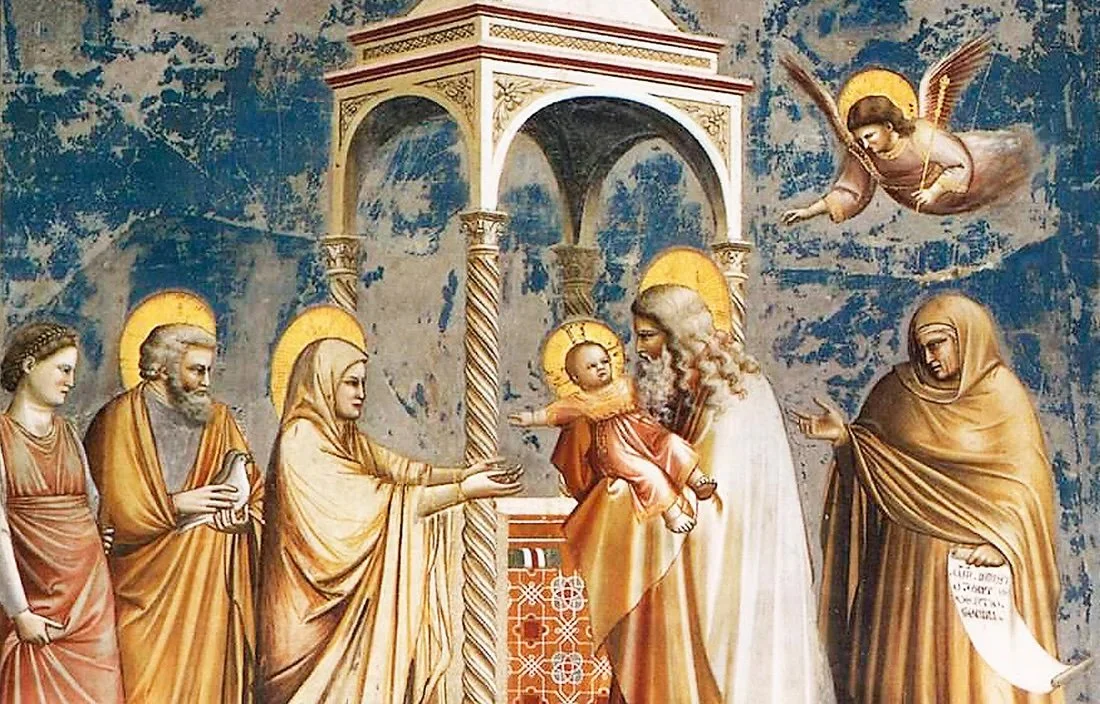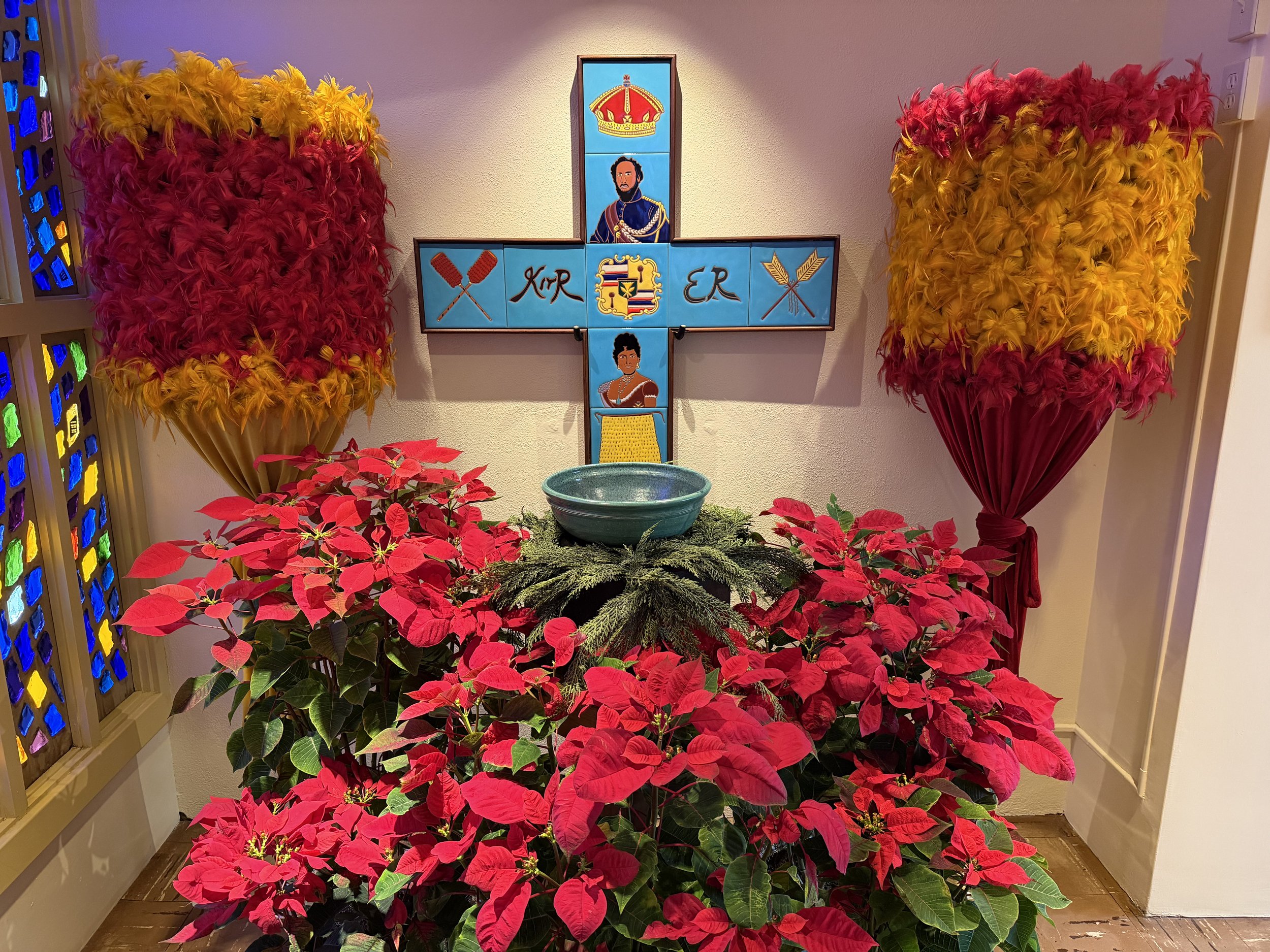From the Rector: Mary Anointing Jesus
/3 April 2022 - LENT 5
John 12: 1-8
Mary took a pound of costly perfume made of pure nard, anointed Jesus' feet, and wiped them with her hair. The house was filled with the fragrance of the perfume.
This story is so full of meaning on this Sunday before we enter into Holy Week. Mary anoints Jesus’ feet with the costly perfume. On Maundy Thursday we will hear how Jesus washes the feet of his disciples. The costly perfume is made of nard – nard was used for the anointing of bodies before their burial. Jesus shall die, and his body will be prepared for burial. Today’s story begins that process. And nard, with its fragrance, as it was used for oils and anointing, was also used in incense. Nard was part of the incense used at the Altar of Incense by the Hebrews at the Temple in Jerusalem. The incense with nard would be a continual offering to God Almighty in that most holy place every morning and every evening.
But beyond this we witness the extravagance by which Mary pours forth her life into Jesus. Judas objects, but Jesus adores Mary’s devotion to him. Many a church has suffered due to those who think like Judas when it comes to the ministry of the church. In Mary’s action we see the appropriate devotion we should have toward the Christ. There is nothing that is too extravagant to be spent on Christ and his ministry.
Yet there is still something greater going on in this Gospel. Jesus is the new temple. He shall be the one, perfect, sufficient, and holy sacrifice. Jesus is the Lamb of God who shall take away the sins of the world. Jesus is the pure lamb, the unblemished lamb, the spotless lamb, and Mary recognizes this, as do Martha and Lazarus. They are hosting the Lord for a dinner at their home before he shall be sacrificed once and for all.
John’s Gospel is rich in symbolism. This dinner party is happening in Bethany, a village across the Mount of Olives – a place where if you go there today, you can see the city of Jerusalem and the Temple Mount in the distance. At the temple, day after day, sacrifices were occurring. Incense was forever being offered at the Altar of Incense. The Temple was a grand place – a spiritual and mystical center for the people of God.
Yet across the way, beyond the Mount of Olives, in the village of Bethany, the true lamb for the sacrifice of the world was being prepared and venerated, by a woman no less, and Jesus allows it. A great conflict is being set up. There is the life of the temple and its economy of Jerusalem that shall directly confront the life of God in the Word-Made-Flesh – Jesus Christ our Lord.
We know the stories of Holy Week. This Lamb named Jesus will wash the feet of his disciples, and then this Lamb will become the sacrifice – not at the Temple – but outside of the city walls in a place used for crucifixions. God in the flesh – Jesus Christ – will not be sacrificed in the temple, but rather he will be sacrificed at Calvary where criminals were executed.
Mary probably has no idea of the weight of her actions, but her faith in Jesus places her to perform a beautiful act of discipleship. She knows that she needs Jesus in order to have true life, and thus, she cannot be too extravagant when it comes to offering Jesus her life and service.
This brings us to Jesus’ comment, “you shall always have the poor with you.” This is certainly true. I am poor, you are poor; the poor are around us all of the time. We all live in poverty – not necessarily economic poverty – but spiritual poverty, emotional poverty, relational poverty, psychological poverty, the poverty that is the result of wealth, poverty that comes due to disease or poor health, and yes, economic poverty – for much of the world there is economic poverty. Jesus is right when he says, “you will always have the poor with you.” There will never be enough in this world to cure the poverty that haunts us.
This is why Christians spend their resources on things that the world sees as useless; we spend our money on things that Judas would call a waste. Poor Judas. He seems to have the greatest poverty in today’s Gospel. Today’s Gospel shows us how the posture of the Christian is to give extravagantly like Mary, and thus the Christian is called to give money to the poor and to the homeless – people seen as worthless by our society. The Christian is called to offer hope to the elderly when the world tries to speed up their death. The Christian is called to honor the life of orphans when the world does not give them families. The Christian is to spend resources extravagantly on the poor, for in Jesus we see the ultimate form of poverty on the cross.
When Jesus instituted the Lord’s Supper on the night before his death, he was giving us this Eucharist as a way of forever being with Christ when so much poverty surrounds us. When we gather for the breaking of the bread and the sharing of the cup, we become one with Christ at his cross and his resurrection. We are not merely remembering what happened, but we are transported in time to the cross and the empty tomb. We witness firsthand how sacrifice leads to new life. We witness firsthand how Mary anoints Jesus, how Jesus washes the feet of his disciples, how Jesus offers his life on the cross, and how the world is made new on Easter Day. All of this comes to life for us when we taste the bread and the wine – when we gather for the mass.
This is why we can never spend too much time or money or passion or devotion on the mass. Everything we do here is for the glory of God. We always have the poor with us, but we do not always have these moments when the bread is broken and the cup of salvation is shared – when Christ is truly present among us.
Next Sunday we have the immense privilege of entering into the mysteries of Holy Week. Without the mass, and without the death and resurrection of Jesus, none of us has life – we are dead. This is what Mary realized when she anointed Jesus, and it is what we realize as we come to honor God with the sacred worship of Holy Week. Next week is of immense importance for us. We will always have poverty around us; poverty easily consumes everything. Opportunities to lavish God following Mary’s example are rare; the worship of the church is often the exception. Here we have the chance to offer everything that we are to the living Christ who saves us through the cross and the empty tomb.
Father Paul Lillie +







